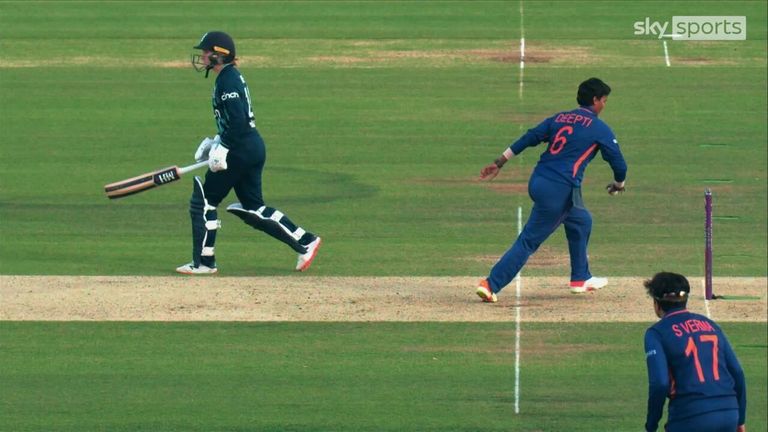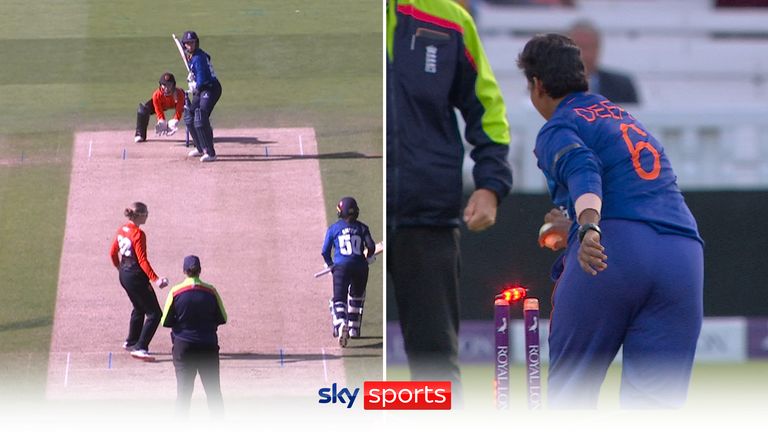'Mankad' dismissals no longer deemed unfair, saliva banned as MCC law changes come into force
Law changes start on October 1, including the rule that a new batter will face strike regardless of whether the previous pair had crossed while the ball was in the air before being caught; laws around wides also amended due to batters moving around their crease more than ever
Saturday 1 October 2022 10:27, UK
'Mankad' dismissals are now classed as run outs, after new law changes by the MCC came into force on October 1.
The 'Mankad' - where a bowler runs out the non-striking batter in their delivery stride if that batter is backing up - is now deemed a legitimate mode of dismissal.
India's women's team recently used the law change in their favour, when bowler Deepti Sharma ran out non-striker Charlie Dean at Lord's in the final ODI of the three-match series.
- India seal England series sweep after controversial 'Mankad' finish
- India defend 'Mankad' finish to ODI | Was wicket within spirit of cricket?
- Heather Knight accuses India bowler Deepti Sharma of 'lying'
Sharma took the bails off after entering her delivery stride, with the dismissal upheld by the third umpire, securing India a 3-0 series win against England.
Dean was in tears after the wicket, with India receiving criticism for the manner of the dismissal.
Sharma defended the dismissal after the match, saying that India had warned Dean about leaving her crease, and it is "as per the rules and guidelines", but injured England captain Heather Knight accused India of lying, saying on Twitter that "no warnings were given" to Dean.
'Onus is on non-striker' | Not the 'right way' to win a game
Reacting after the match on Sky Sports Cricket, Michael Atherton said it is up to the non-striker to "stay in your ground until the ball is released".
"I always find it odd when 'Mankads' happen. It's historically associated with something underhand, but whenever it happens, the focus always falls on the fielding side and the bowler as if they've done something wrong.
"A 'Mankad' cannot happen if the non-striker stays in their ground. And that's where the onus falls.
"The message is clear really: If you're a non-striker at the non-striker's end, you stay in your ground until you see the ball released, and this thing can never happen.
"The debate will never happen, and all the outpouring of emotion on social media can't happen. It's simple, stay in your ground.
"The law is absolutely clear."
Lydia Greenway said that, while it is within the rules, it doesn't "feel like the right way to win a game".
"The way in which it's managed I would disagree with. If I was captain of that team, I would say lets give them a warning, and then make sure that Charlie Dean is aware of what she's doing.
"Because as youngsters growing up playing the game, you're taught to back-up, and if you look at Charlie Dean backing up, she was just focussed on what was happening at the other end.
"I don't think she was trying to gain an unfair advantage.
"She was just simply focussing on what was in hand. She was just looking at what's happening, literally turned around and Deepti Sharma has decided to do that, which, we must say, she is allowed to do."
This manner of dismissal has been heavily criticised by some for being against the spirit of the game, and it was previously under the unfair play section of the law.
However, it is now classed as a legitimate run out.
Saliva banned; changes to dead ball law
In other changes that come into force, using saliva to shine the ball will be banned and considered tampering.
The use of saliva was prohibited following the outbreak of Covid-19 and research by the sport's lawmakers found this "had little or no impact on the amount of swing the bowlers were getting", with players using sweat to polish the ball, which was equally effective.
This law change around using saliva to shine the ball has been made permanent.
Annoucing the law change earlier this year, the MCC said it "removes any grey areas of fielders eating sugary sweets to alter their saliva to apply to the ball," with its use treated the same way as "any other unfair methods of changing the condition of the ball".
After a successful trial in The Hundred by the England and Wales Cricket Board, a new batter coming into the crease will face the next delivery regardless of whether the previous pair had crossed while the ball was in the air before being caught.
The law around judging a wide has been amended, given batters are now moving laterally around the crease more before the ball is bowled.
There are also several changes to the 'dead ball law', the most significant of which is if either side is disadvantaged by a person, such as a pitch invader, an animal or other object within the field of play which has a material impact on the game.
The first men's international game under the new rules will be on October 2, when South Africa play India before Pakistan face England in the seventh and deciding match of their T20I series.
The upcoming men's T20 World Cup in Australia will also incorporate the new rules.
Watch the series-deciding third T20 international between Pakistan and England live on Sky Sports Cricket on Sunday. Coverage begins at 3pm with the first ball at 3.30pm.






